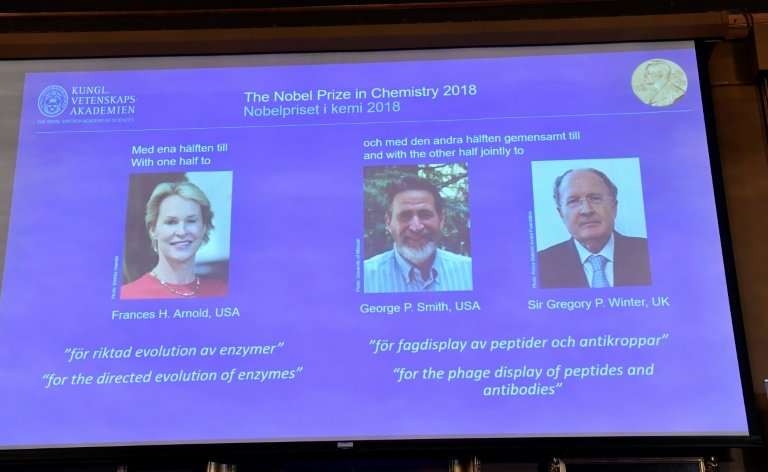How Nobel-winning chemists used and directed evolution

Three scientists shared the 2018 Nobel Chemistry Prize on Wednesday for their work in harnessing the power of evolution, which led to a range of breakthroughs including better biofuels and more targeted drugs.
Here is a brief explanation of their discoveries and how they have been applied:
New enzymes
Frances Arnold of the US was awarded for using the principles of evolution to develop new enzymes, which are the basic chemical tools of life.
At first she tried to force such changes using more traditional methods, but her breakthrough came when she allowed evolutionary forces such as selection and even chance to govern the development of enzymes, while still subtly guiding them.
It was the first step toward a revolution in the field, with the slight but fundamental changes leading to more environmentally friendly chemical substances, new pharmaceuticals, and more renewable fuels, according to the Royal Swedish Academy of Sciences.
Phage antibodies
The principles behind evolution were also used by the other Nobel winners, George Smith of the US and Britain's Gregory Winter, who focused on tiny viruses that infect bacteria called bacteriophages—or phages for short.
Using this invading element, George Smith invented an "elegant" method called phage display in which these invading phages introduce antibodies—which function like "targeted missiles", the Academy said.
Gregory Winter then applied directed evolution to develop the world's first pharmaceutical entirely based on a human antibody.
This has since led to a wide range of different drugs that can target certain tumour cells, arthritis, the toxin that causes anthrax, help slow down lupus and even in some cases cure metastatic cancer.
Many more such antibodies are currently undergoing clinical trials, including some to combat Alzheimer's disease, the Academy said.
Alan Boyd, president of Britain's Faculty of Pharmaceutical Medicine, hailed the award.
"The use of antibodies has resulted in a paradigm shift in the way that we now treat so many diseases which has brought significant benefits to patients across the world and will continue to do so for years to come," he said.
© 2018 AFP




















